
Verba-Anuario Galego de Filoloxia
Scope & Guideline
Illuminating the Depths of Galician Linguistics
Introduction
Aims and Scopes
- Linguistic Variation and Change:
The journal places significant emphasis on the study of linguistic variation across different Spanish dialects, examining how regional and social factors influence language use and evolution. - Morphosyntactic Analysis:
A core area of research within the journal focuses on the morphosyntactic properties of Spanish. This includes studies on nominalizations, verb forms, and syntactic structures in various contexts. - Pragmatics and Discourse Analysis:
Research exploring the pragmatic functions of language, particularly in conversational contexts, is a prominent feature. This encompasses studies on discourse markers, information structure, and communicative strategies. - Historical Linguistics:
The journal also addresses historical perspectives on the Spanish language, including diachronic studies that trace the evolution of linguistic forms and usages over time. - Language Contact and Sociolinguistics:
The intersection of language contact and its impact on linguistic features is explored, particularly in the context of Spanish and its interaction with other languages and dialects. - Interdisciplinary Approaches:
The journal encourages interdisciplinary research that integrates linguistics with cultural studies, history, and social sciences, thereby enriching the understanding of language as a dynamic social phenomenon.
Trending and Emerging
- Sociolinguistic Studies:
There is an increasing trend towards sociolinguistic studies that explore attitudes, beliefs, and variation within Spanish language communities, indicating a growing interest in the social dimensions of language. - Pragmatics and Contextual Analysis:
Emerging research on pragmatics, particularly in relation to discourse markers and conversational analysis, suggests a shift towards understanding language use in context rather than in isolation. - Diachronic Variation and Language Evolution:
Recent works focusing on diachronic variation and historical changes in language usage show a renewed interest in how language evolves over time, particularly in response to social and cultural factors. - Interdisciplinary Linguistic Studies:
The journal is increasingly publishing interdisciplinary research that connects linguistics with other fields such as cultural studies, history, and anthropology, reflecting a holistic approach to language analysis.
Declining or Waning
- Traditional Grammar Studies:
There seems to be a reduced emphasis on traditional grammar studies, with fewer papers dedicated to prescriptive grammatical rules and more focus on descriptive and analytical approaches to language. - Historical Lexicography:
Although historical studies are still included, the specific focus on historical lexicography and the compilation of dictionaries appears to be less frequent, as newer research trends emphasize language use in contemporary contexts. - Language Teaching Methodologies:
Research concerning language teaching methodologies, particularly those rooted in traditional approaches, has declined. This reflects a broader trend towards more communicative and integrative teaching strategies in the field.
Similar Journals
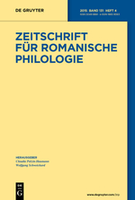
ZEITSCHRIFT FUR ROMANISCHE PHILOLOGIE
Exploring the Rich Tapestry of Romance Languages and LiteratureZEITSCHRIFT FUR ROMANISCHE PHILOLOGIE, published by Walter de Gruyter GmbH, stands as a prominent peer-reviewed journal dedicated to the fields of Linguistics, Literature, and Literary Theory. Established in 1877 and continuing its legacy to the present day, this esteemed journal offers a platform for comprehensive scholarship that explores the intricacies of Romance languages and their literary heritage. With a notable Q1 ranking in Literature and Literary Theory and a Q2 ranking in Linguistics and Language, it has secured its place among leading resources in the humanities. Researchers, educators, and students benefit from its rich historical context and current contributions to the understanding of Romance languages and literature. Though currently not available as Open Access, the journal prioritizes the dissemination of high-quality research, making significant strides in fostering academic dialogue and advancement. Its address at Genthiner Straße 13, Berlin, Germany, situates it in a hub of scholarly activity, bridging the past with contemporary literary discourse.
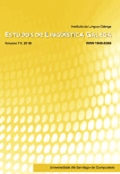
Estudos de Linguistica Galega
Empowering Research in Contemporary Linguistic ContextsEstudos de Linguistica Galega, an esteemed journal published by the University of Santiago de Compostela, provides a critical platform for scholars engaged in the vibrant field of linguistics, particularly focusing on the Galician language and its surrounding linguistic phenomena. Launched in 2009, this Open Access journal enables unrestricted dissemination of research, facilitating engagement from a global audience. With an impact factor that positions it within the Q4 quartile in Linguistics and Language, it reveals a strong commitment to advancing the discourse in this niche. It ranks #691 out of 1088 in the Arts and Humanities category, underscoring its relevance in the academic landscape. The journal aims to foster collaboration and innovation among researchers and practitioners, making significant contributions to understanding linguistic diversity and its implications in contemporary society. Located in Santiago de Compostela, Spain, the journal encourages submissions that explore theoretical, empirical, and applied linguistic studies, thereby inviting researchers, professionals, and students to contribute to this growing field.
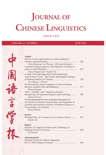
JOURNAL OF CHINESE LINGUISTICS
Advancing the Frontiers of Chinese LinguisticsJOURNAL OF CHINESE LINGUISTICS, published by the JOURNAL CHINESE LINGUISTICS, is a prominent periodical that serves as a vital resource for researchers and scholars in the fields of linguistics and Chinese studies. With its ISSN 0091-3723, this journal has been contributing to the academic community since 1996 and continues to publish innovative research until 2024. Although it is classified in the third quartile (Q3) for both Arts and Humanities and Linguistics categories, its focus on Chinese linguistics positions it uniquely within this specialized domain. The journal is committed to advancing the understanding of Chinese language structures, usage, and context, encouraging interdisciplinary dialogue among linguists and language researchers. While currently not labeled as open access, the journal remains accessible to institutions and scholars worldwide, creating an invaluable platform for disseminating knowledge. As such, it plays a critical role in promoting linguistic diversity and cultural awareness within the academic landscape.

Journal of Slavic Linguistics
Bridging Theory and Practice in Slavic LinguisticsJournal of Slavic Linguistics, published by SLAVICA PUBLISHERS, is a key academic resource dedicated to the exploration of Slavic languages and linguistics. Established to provide a comprehensive platform for scholarly research, this journal addresses the intricate dynamics of Slavic phonetics, syntax, semantics, and discourse, making significant contributions to both theoretical and applied linguistics. The journal holds an impact factor that reflects its value in the linguistic community, particularly as it is ranked in the Q4 category in Linguistics and Language for 2023. With a focus on a wide range of topics within the field, the Journal of Slavic Linguistics serves as an essential reference for researchers, educators, and students alike, fostering an appreciation and deeper understanding of Slavic linguistic phenomena. Although currently not an Open Access journal, it remains accessible to a broad audience keen on engaging with contemporary linguistic scholarship.
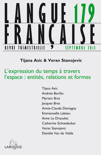
LANGUE FRANCAISE
Transforming Understanding of French Language DynamicsLANGUE FRANCAISE, published by LAROUSSE, stands as a premier journal in the realm of linguistics and language studies, boasting an impressive Q1 quartile rating in the 2023 Linguistics and Language category. With its international reputation anchored in France, this journal presents critical research and discussions that advance our understanding of the French language, its structures, usage, and evolution. Although not an open-access publication, LANGUE FRANCAISE is indexed with an ISSN of 0023-8368 and an E-ISSN of 1957-7982, reflecting its scholarly credibility and impact, including Scopus rankings that place it competitively in the fields of arts and humanities as well as social sciences. This journal serves as an essential resource for researchers, practitioners, and students aiming to deepen their knowledge and engage in scholarly debates that shape contemporary linguistic thought. The journal's commitment to high-quality research continues to foster an enriching academic environment and contribute to the dynamic discourse surrounding language and linguistics.

LINGUISTIQUE
Exploring the Depths of Linguistic KnowledgeLINGUISTIQUE, an esteemed journal published by PRESSES UNIV FRANCE, serves as a vital platform for scholarly discourse in the fields of linguistics and language studies. With its ISSN 0075-966X and E-ISSN 2101-0234, this French journal has been a significant contributor to the understanding of linguistic phenomena since its inception in 2004, and it continues its journey through to 2024. Although currently categorized in the Q4 quartile for both Arts and Humanities (miscellaneous) and Linguistics and Language, its commitment to publishing quality research encourages a diverse range of articles, reviews, and innovative studies. Positioned in the 32nd and 29th percentiles for its respective fields according to Scopus rankings, LINGUISTIQUE is dedicated to advancing knowledge and stimulating engagement among researchers, professionals, and students alike. While it does not offer open access, the journal remains an essential resource for those who seek to deepen their understanding of linguistic principles in a global context, facilitating a richer discourse that connects theory with practice.
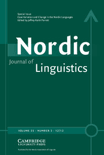
Nordic Journal of Linguistics
Unveiling the complexities of language through rigorous scholarship.Nordic Journal of Linguistics, published by Cambridge University Press, serves as a prominent platform for the dissemination of cutting-edge research in the field of linguistics. Established in 1978 and spanning over four decades, the journal has curated a rich repository of scholarly work that reflects the dynamic and evolving nature of language studies. With an impressive Q2 ranking in both the Linguistics and Language category and a commendable performance in Scopus rankings, placing it at the 74th percentile among Arts and Humanities, the journal is recognized for its high academic standards and impact on contemporary linguistic research. Scholars and practitioners can access a variety of studies that delve into different languages, linguistic theories, and methodologies, fostering broader understanding and dialogue within the linguistic community. Although the journal does not currently offer open-access options, it remains an invaluable resource for researchers, professionals, and students keen on advancing their knowledge of language and linguistics.
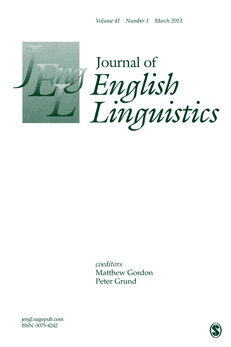
JOURNAL OF ENGLISH LINGUISTICS
Championing Rigorous Inquiry into the English LanguageJOURNAL OF ENGLISH LINGUISTICS, published by SAGE PUBLICATIONS INC in the United Kingdom, is a premier scholarly journal dedicated to advancing the field of linguistics through a rigorous exploration of the English language. With its ISSN 0075-4242 and E-ISSN 1552-5457, this quarterly journal boasts an impressive impact factor and maintains a notable standing within the academic community, evidenced by its Q1 ranking in Linguistics and Language. Its rich history, covering publications from 1967 to 2024, ensures that it remains an essential resource for researchers, professionals, and students alike, fostering critical discourse and innovative research in English linguistics. While the journal is not open access, it offers a wealth of valuable insights and cutting-edge findings that are vital for anyone interested in understanding the complexities of language structure, usage, and evolution. For those seeking to stay at the forefront of linguistic scholarship, JOURNAL OF ENGLISH LINGUISTICS represents an indispensable cornerstone in the field.
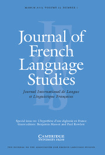
Journal of French Language Studies
Fostering Academic Excellence in French Language StudiesJournal of French Language Studies, published by Cambridge University Press, is a prestigious and leading journal in the field of linguistics and language that provides a platform for scholarly articles and research findings relevant to the French language and its various dimensions. With an impressive Q1 ranking in the 2023 categorization and ranked #257 out of 1088 in Scopus for Language and Linguistics, this journal plays a pivotal role in advancing the study of French linguistic methodologies, sociolinguistics, and applied linguistics. Since its inception in 1991, the journal has continually contributed to the academic community, attracting innovative investigations and theoretical discussions that enrich understanding and research in the field. Researchers and students enjoy comprehensive access to critical analysis and emerging trends, and as it continues to converge towards 2024, the journal promises to remain an essential resource for exploring the evolving landscape of French language studies.

Turkic Languages
Illuminating the Cultural Contexts of Turkic LanguagesTurkic Languages is an esteemed academic journal published by HARRASSOWITZ VERLAG, dedicated to the exploration and analysis of Turkic languages within the broader fields of linguistics and language studies. With an ISSN of 1431-4983, this journal serves as a vital platform for researchers, professionals, and students interested in the intricate structures, dynamics, and cultural contexts of Turkic languages. Although it currently operates without an Open Access option, the journal's commitment to quality research is evident in its placement within the Q4 category of Linguistics and Language for 2023, alongside its Scopus rankings where it stands in the 30th and 26th percentiles for Language and Linguistics across Arts and Humanities and Social Sciences, respectively. The journal's scope encompasses a variety of linguistic phenomena, striving to foster a deeper understanding of Turkic languages and their significance in the global linguistic landscape. With converged years from 2017 to 2022, Turkic Languages continues to uphold its reputation as a crucial resource for advancing scholarship in this specialized field.